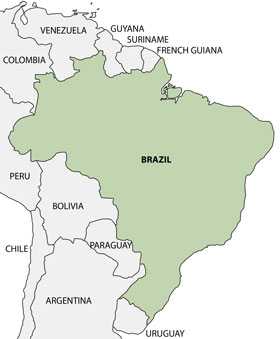Pertussis in Brazil
Español: La tosferina en Brasil
On this Page

Overview
In May 2015, CDC-Latin American Pertussis Project conducted an initial assessment of the pertussis surveillance system and laboratory capacity in Brazil. Currently, Brazil’s Ministry of Health uses standardized data collection forms and case definitions for pertussis (known as coqueluche). All regional and national laboratories have laboratory diagnostic capacity in culture. The national reference laboratory in São Paulo, Instituto Adolfo Lutz (IAL) (in Portuguese), implemented real-time polymerase chain reaction (PCR) as a diagnostic test in 2009. Since 2014, two additional state laboratories have diagnostic capacity in multi-target real-time PCR. IAL also conducts molecular characterization of strains of B. pertussis received from state laboratories (known as LACENs) using pulsed-field gel electrophoresis (PFGE) technique and serotyping.
Case Definition
The Brazilian case definition for a suspected case of pertussis includes two age groups:
- Under 6 months: Cough of at least 10 days and at least one of the following symptoms:
- Paroxysmal cough
- Inspiratory whoop
- Posttussive vomiting
- Cyanosis
- Apnea
- Choking
- 6 months and older: Cough of at least 14 days and at least one of the following symptoms:
- Paroxysmal cough
- Inspiratory whoop
- Posttussive vomiting
Pertussis cases are confirmed if they meet the case definition and have positive laboratory confirmation (by culture or real-time PCR), are linked epidemiologically to a laboratory-confirmed case, or are clinically confirmed (by meeting case definition and having at least 2 symptoms described per age group) as specified in Brazil’s pertussis surveillance guidelines [7 pages] (in Portuguese).
Vaccine Abbreviations
- DTP – Diphtheria and tetanus toxoids and whole cell pertussis vaccine
- Tdap – Tetanus toxoid, reduced diphtheria toxoid and acellular pertussis vaccine
- HB – Hepatitis B vaccine
- Hib – Haemophilus influenzae serotype b vaccine
Immunization Program
Brazil’s routine pertussis immunization program includes a pentavalent vaccine, which contains DTP (whole cell pertussis component), HB, and Hib, administered at 2, 4, and 6 months, with a booster (DTP) at 15 months and 4 years. Brazil’s Ministry of Health recommends Tdap for healthcare workers who work with infants. In 2014, they implemented a dose of Tdap for pregnant women (to be administered during each pregnancy beginning at 20 weeks gestation). If a woman was not vaccinated during her pregnancy, they recommend vaccination as early as possible postpartum.
View Brazil’s complete vaccination schedule (in Portuguese).
Related Pages
- Brazil’s surveillance guidelines for pertussis (in Portuguese)
- Brazil’s epidemiologic bulletins, and tables of reported cases and deaths due to pertussis (in Portuguese)
- Technical report on Tdap recommendations [22 pages] (in Portuguese)
- Page last reviewed: August 4, 2017
- Page last updated: August 7, 2017
- Content source:


 ShareCompartir
ShareCompartir